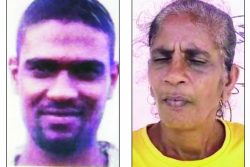Dear Editor,
hope it is not too late for your newspaper to entertain a few remarks on the letter written by Mr Ravi Dev titled `It was Kwayana’s writings that helped shape the definition of the post 1957 PPP government as an Indian government’ and published in your newspaper on April 8, 2024. First, let’s get rid of factual misunderstanding. Mr. Dev says that, in his opinion, I have insisted that the unfortunate murder of Felix Ross took place on the 28 of August 1961. I never thought it was the 28th. I always knew the murder took place on the night of the election on the 21st of August 1961 and I understood the atmosphere. The election date was therefore never in dispute.
I hope that that qualification would remove any accusation of political motive, which I did not even suspect. I saw the murder as a mood of triumphalism, expressing itself in that and other ways.
Then Mr. Dev concluded that after the 1957 election, I, as editor of the New Nation, the PNC’s newspaper, was responsible for branding the PPP, a government that discriminated racially. That accusation, I guess, is supported by the observation of what was written in the newspaper and attributed to the editor. I am sorry that it still hurts. I was not the only person making that judgement, and I shall move on to draw more conclusions.
The next point I think Mr. Dev is making is that I am the only person who calls the murder of Felix Ross in 1961 the opening of violence, whereas other writers and observers, some more competent than I, place the opening of what is called political violence in 1962, Black Friday, the so-called Black Friday. I don’t have difficulty with the opinion of those analysts. I see it from my point of view, and I am in politics to promote certain ideals, a multi-ethnic society of equality.
A big disappointment for me was in Dr. Jagan’s address after the election. The Sunday night after the election, Dr. Jagan spoke about the pre-election violence, and he spoke, in my recollection, after the killing of Felix Ross because the incidents of violence could no longer be ignored because it was Guyana’s first political (electoral) murder. After the election, as the winner, he had to deal with the restoration of communal peace through his appeal to normalise conditions, But my accusation was that he did not mention or condemn the killing of Felix Ross. Condemning it is condemning a crime.
I know I have offended many of the PPP supporters and others by describing Dr. Jagan in that speech he made in response to what he called “violence between people of different races” by calling him a coward. I know that, and I am sorry for that offence. But I am not calling him a coward for being afraid of imperialism, apartheid, and those world forces and the warmongers. He was not scared of those people. He did not know how to rebuke his supporters, a few of whom had put the party in a terrible situation, making it difficult for people of goodwill to continue their support.
I also want to point out that although I am accused of using 1961 as the beginning of racial violence, I can quote from the words of Dr. Jagan that it had a shock effect on him also because he used the following words in his broadcast long before 1962 and Black Friday. And I quote, “No greater calamity could have befallen us.” He was the leader in the anti-colonial movement. He felt that there could be no greater calamity than that series of incidents that included the murder of Felix Ross, which he judiciously decided not to mention. These are some of the basic facts.
I still believe that the turn occurred before Black Friday and that election night was the high point from which the traditional communal peace has not recovered.
Some readers may understand that what I lamented even more than the destruction of physical structures was the human fatalities. The first political murder in Guyana opened a dark period in what I saw as a decline in communal peace and a degeneration of inter-communal relationships.
In Mr. Dev’s judgement, what appeared in the New Nation, a weekly paper read by those who bought it, was more influential in informing non-PPP supporters’ opinions than the public actions in the PPP’s name.
Further, Next Witness was not a booklet I set down to write for propaganda purposes. It was my intended submission of facts and opinion to the Wynn Parry commission investigating “Black Friday” in 1962. It was clear that it was not a lightly written document, and I had looked forward to defending or at least explaining what I had submitted both in leading my evidence and in whatever cross examination I was exposed to.
I wish to leave it here unless my distinguished compatriot wishes to continue this inquiry in the present atmosphere.
I thank Mr. Dev for taking the time to greet me on an important and perhaps undeserved anniversary and wish him, in return, good health.
Yours sincerely,
Eusi Kwayana






